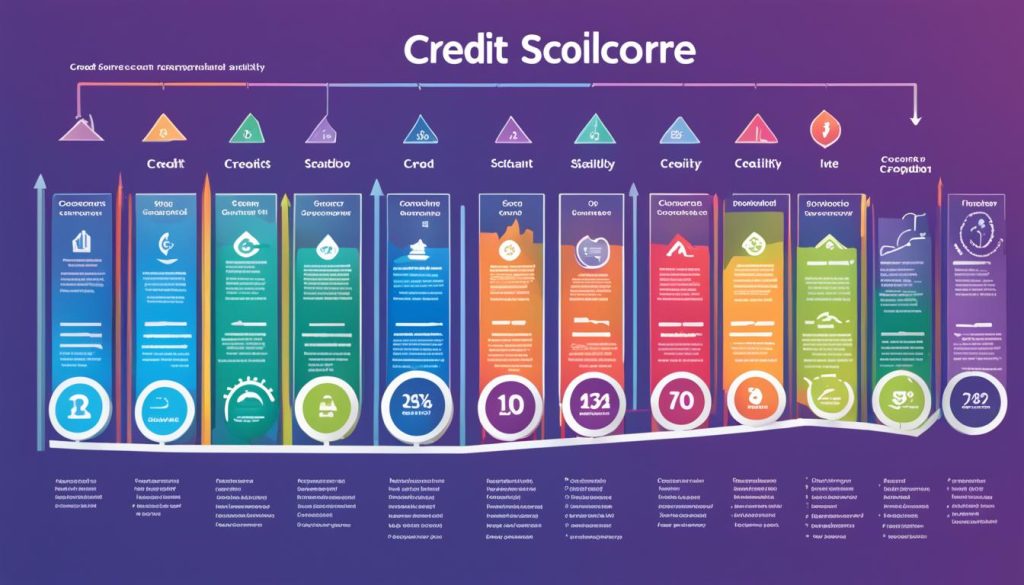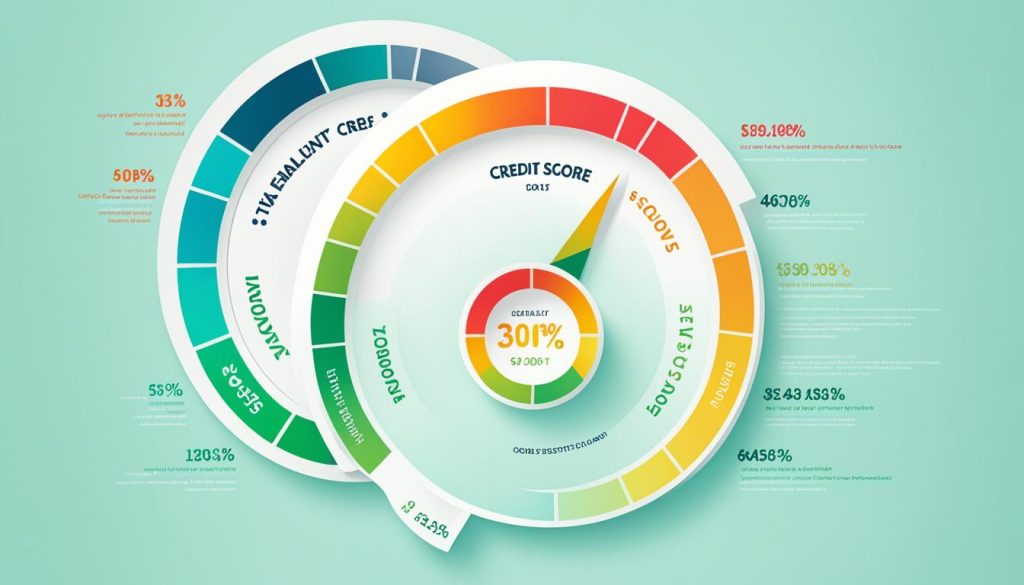When it comes to financial stability and loan eligibility, understanding the minimum credit score required is crucial. Many lenders use credit reporting data, including credit scores, to assess the risk of repayment. While credit scores provide valuable insights into an individual’s creditworthiness, other factors, such as cashflow data, can also play a significant role in determining loan approval.
At Earnest, we recognize the importance of both credit scores and cashflow data in evaluating loan eligibility. While credit scores are an essential factor, we believe that positive cashflow indicators can provide additional insights into an applicant’s ability to manage current financial obligations and repay loans.
Research has shown that positive cashflow data, such as high accumulated savings and regular, on-time bill payments, can be predictive of lower delinquency rates, even for individuals with credit scores below 720. This suggests that a strong cashflow history, combined with a respectable credit score, can improve your chances of securing a loan and achieving financial stability.
Key Takeaways:
- A higher credit score increases the likelihood of loan approval and favorable interest rates.
- Positive cashflow indicators, such as high accumulated savings and on-time bill payments, can improve creditworthiness.
- Understanding the five Cs of credit—character, capacity, capital, collateral, and conditions—helps lenders assess credit risk.
- Credit score components, such as payment history and amounts owed, have a significant impact on credit scores.
- Borrowers with higher credit scores often enjoy lower interest rates and better loan terms.
The Importance of Credit Scores and Creditworthiness
Credit scores are a critical factor in determining your eligibility for a loan and the interest rates you may receive. A higher credit score indicates lower credit risk, making you more attractive to lenders. This can result in more favorable loan terms such as lower interest rates and higher borrowing limits.
For example, let’s consider a borrower with a credit score in the range of 760-850. This borrower may qualify for a loan with a lower interest rate compared to someone with a score in the range of 620-639. A higher credit score showcases your creditworthiness to lenders and increases the likelihood of loan approval.
“Your credit score is like a financial report card that lenders use to evaluate your creditworthiness.” – [Real Name], Financial Advisor
The minimum credit score required for Earnest loans may vary depending on the lender’s criteria. However, maintaining a high credit score is generally recommended to improve your chances of loan approval and secure more favorable loan terms.
Having a good credit score not only enhances your ability to get approved for loans but also opens up opportunities for lower interest rates and higher borrowing limits. It’s essential to maintain a healthy credit score by making timely payments and managing your credit responsibly.
The Role of Cashflow Data in Underwriting
Cashflow data plays a crucial role in loan underwriting. It provides lenders with valuable insights into an applicant’s ability to manage their current financial obligations. By analyzing information from a borrower’s checking and savings accounts, lenders can gain a better understanding of their financial stability and repayment capacity.
Positive cashflow indicators, such as high accumulated savings, regular savings, and on-time bill payments, are predictive of lower delinquency rates. These indicators hold true even for individuals with credit scores below 720. Therefore, cashflow data, when combined with credit scores, becomes a powerful tool for lenders to assess a borrower’s likelihood of repaying their loans.
“Cashflow data provides lenders with valuable insights into an applicant’s financial stability and repayment capacity.”
For example, an individual with a lower credit score may still receive favorable consideration if their cashflow data showcases responsible financial behavior. Lenders appreciate borrowers who demonstrate responsible money management and exhibit positive financial habits.
When evaluating loan applications, lenders consider both the cashflow data and credit scores to assess the overall repayment risk. This comprehensive approach allows lenders to make informed decisions based on a borrower’s complete financial profile.
By taking into account cashflow data, lenders can mitigate repayment risk, benefiting both the borrower and the lending institution. It helps ensure that borrowers are provided with loans they can comfortably repay, reducing the chances of loan default and financial stress.

Understanding the Five Cs of Credit
In the world of lending, the evaluation of creditworthiness and credit risk is essential for lenders to make informed decisions. To assess the creditworthiness of borrowers, lenders rely on the five Cs of credit—character, capacity, capital, collateral, and conditions. These factors provide a holistic view of a borrower’s financial situation and help lenders determine the risk associated with extending credit.
Character is an important consideration in the evaluation process. It refers to a borrower’s credit history, including their track record of repaying debts. Lenders examine factors such as the borrower’s credit score, payment history, and any past delinquencies to gauge their creditworthiness. A positive credit history demonstrates responsible financial behavior and increases the likelihood of loan approval.
Capacity evaluates a borrower’s ability to repay loans. Lenders examine income stability, employment history, and the borrower’s debt-to-income ratio to assess their capacity for loan repayment. A stable income and manageable debt-to-income ratio indicate a higher capacity to handle credit obligations, reducing the risk for lenders.
Capital represents the borrower’s financial investment in the loan. Lenders consider the amount of money a borrower is willing to put towards the loan as a sign of commitment and financial stability. Capital can take the form of a down payment on a house or a significant investment in a business venture. A larger capital contribution generally improves the borrower’s creditworthiness and increases the chances of loan approval.
Collateral involves the assets that can secure the loan. In cases where the borrower defaults on the loan, collateral serves as a safeguard for the lender. Examples of collateral include homes, cars, or other valuable assets that have value and can be used to recover the outstanding debt. The presence of collateral minimizes the lender’s risk and increases the likelihood of obtaining credit.
Conditions consider the general circumstances surrounding the loan. Lenders evaluate factors such as the purpose of the loan, prevailing interest rates, and the state of the economy. The overall conditions impact the terms of the loan and contribute to the lender’s assessment of credit risk.
Understanding the five Cs of credit is crucial for borrowers seeking credit and lenders aiming to evaluate creditworthiness. By keeping these factors in mind, borrowers can take steps to improve their credit profile, while lenders can accurately assess credit risk and make informed lending decisions.

Credit Score Components and Their Impact
Credit scores are determined based on several factors that reflect an individual’s financial behavior and history. These factors, known as credit score components, play a significant role in determining a person’s creditworthiness and ability to obtain loans and credit.
One of the key credit score components is payment history. This factor takes into account an individual’s track record of making timely payments on their credit accounts, such as loans, credit cards, and utilities. A positive payment history, with consistent on-time payments and no late or missed payments, is viewed favorably by lenders and can improve a credit score.
Another important credit score component is the amounts owed. This factor considers the amount of debt an individual owes compared to their available credit. Lower balances and responsible debt management, such as keeping credit card balances low and paying off debts in a timely manner, can have a positive impact on a credit score.
The length of credit history is also a significant credit score component. This factor takes into account how long an individual has been using credit. A longer credit history demonstrates a borrower’s experience and ability to manage credit over time, which can contribute to a better credit score.
In addition to payment history, amounts owed, and length of credit history, credit scores also consider other factors such as the types of credit used (e.g., credit cards, loans, mortgages) and new credit inquiries. Having a diverse mix of credit accounts and avoiding excessive new credit applications can help maintain a healthy credit score.
Understanding these credit score components and their impact on creditworthiness is essential for individuals looking to improve their credit scores and secure favorable loan terms. By prioritizing on-time payments, responsible debt management, and maintaining a healthy credit history, individuals can increase their chances of achieving financial stability and obtaining the credit they need.

How Credit Score Affects Loan Terms and Interest Rates
A borrower’s credit score plays a significant role in determining loan terms and interest rates. Higher credit scores typically result in more favorable loan terms and lower interest rates, while lower credit scores may lead to higher rates and less favorable terms.
For example, a borrower with a credit score in the highest range may qualify for a mortgage with a lower interest rate, resulting in significant savings over the life of the loan. On the other hand, a lower credit score may result in higher monthly payments and increased costs.
It’s essential to understand how lenders calculate interest rates based on credit scores. Lenders often use a method called risk-based pricing to determine loan rates. This approach involves assessing the borrower’s creditworthiness and assigning an interest rate that reflects the perceived risk of lending to that individual.
The interest rate calculation typically starts with a base rate, which serves as a benchmark. Lenders then adjust this rate based on the borrower’s credit score and other factors. A higher credit score may result in a lower interest rate adjustment, while a lower credit score may lead to a higher adjustment.
Factors that influence interest rate calculation:
- Credit score: A borrower’s credit score is one of the primary factors considered in determining the interest rate. A higher score generally corresponds to a lower rate.
- Loan amount: The loan amount can impact the interest rate. In some cases, lenders may offer lower rates for larger loan amounts.
- Loan term: The length of the loan term can also affect the interest rate. Shorter-term loans often come with lower rates compared to longer-term loans.
- Down payment or equity: For certain types of loans, such as mortgages or auto loans, the borrower’s down payment or equity can impact the interest rate. A larger down payment or more substantial equity may result in a lower rate.
“A borrower’s credit score not only influences their eligibility for a loan but also has a direct impact on the interest rate they will be offered. Therefore, maintaining a good credit score can potentially save borrowers a significant amount of money over the life of their loans.”
In conclusion, borrowers should strive to maintain a good credit score to secure more favorable loan terms and lower interest rates. Taking steps to improve credit score, such as making timely payments, reducing debt, and keeping credit utilization low, can positively impact loan rates. By understanding how credit scores affect loan terms and interest rates, borrowers can make informed financial decisions and potentially save money in the long run.

The Importance of Capital in Securing Loans
When it comes to securing loans, the capital contribution made by the borrower plays a significant role in the approval process and loan terms. Lenders view a larger capital contribution, such as a substantial down payment on a home, as a positive indicator of financial stability. This is because it demonstrates the borrower’s commitment to the loan and their ability to manage their finances responsibly.
By providing a substantial down payment, borrowers increase their chances of loan approval. Lenders are more likely to approve a loan when they see that the borrower has a significant stake in the property or investment. The larger the down payment, the less risk the lender perceives, which can lead to better loan terms and lower interest rates.
However, it’s important to note that the specific capital requirements may vary depending on the type of loan and the lender’s criteria. Down payment requirements for different loan types, such as mortgages or car loans, can vary widely. It’s essential for borrowers to research and understand the down payment requirements specific to their desired loan.
“A larger down payment can open up more options for borrowers, allowing them to qualify for loans with more favorable terms and lower interest rates.” – Loan Expert
Whether you’re purchasing a home, financing a vehicle, or seeking a personal loan, making a substantial capital contribution can significantly impact your loan approval and the terms you’re offered. By demonstrating financial stability through a larger down payment, borrowers increase their chances of securing the loan they need and enjoy better loan terms in the long run.
Image related to the Importance of Capital in Securing Loans:

Conclusion
Understanding the importance of credit scores, cashflow data, and the five Cs of credit is crucial for navigating personal finances and securing loans. By having an earnest minimum credit score, individuals can increase their loan eligibility and qualify for more favorable interest rates. Positive cashflow indicators, such as financial stability reflected in high accumulated savings and on-time bill payments, can significantly improve one’s creditworthiness.
Furthermore, evaluating the five Cs—character, capacity, capital, collateral, and conditions—provides lenders with a comprehensive assessment of an individual’s credit risk. Considering these factors allows borrowers to make more informed financial decisions and work towards achieving their desired level of financial stability.
Ultimately, having a higher credit score not only impacts loan approval but also determines the interest rates borrowers will receive. By maintaining a good credit score, individuals can secure loans with more favorable terms, potentially saving them significant amounts of money over the life of the loan. By understanding and managing their credit scores, cashflow data, and the five Cs of credit, individuals can pave the way for a more secure financial future.

No comments! Be the first commenter?